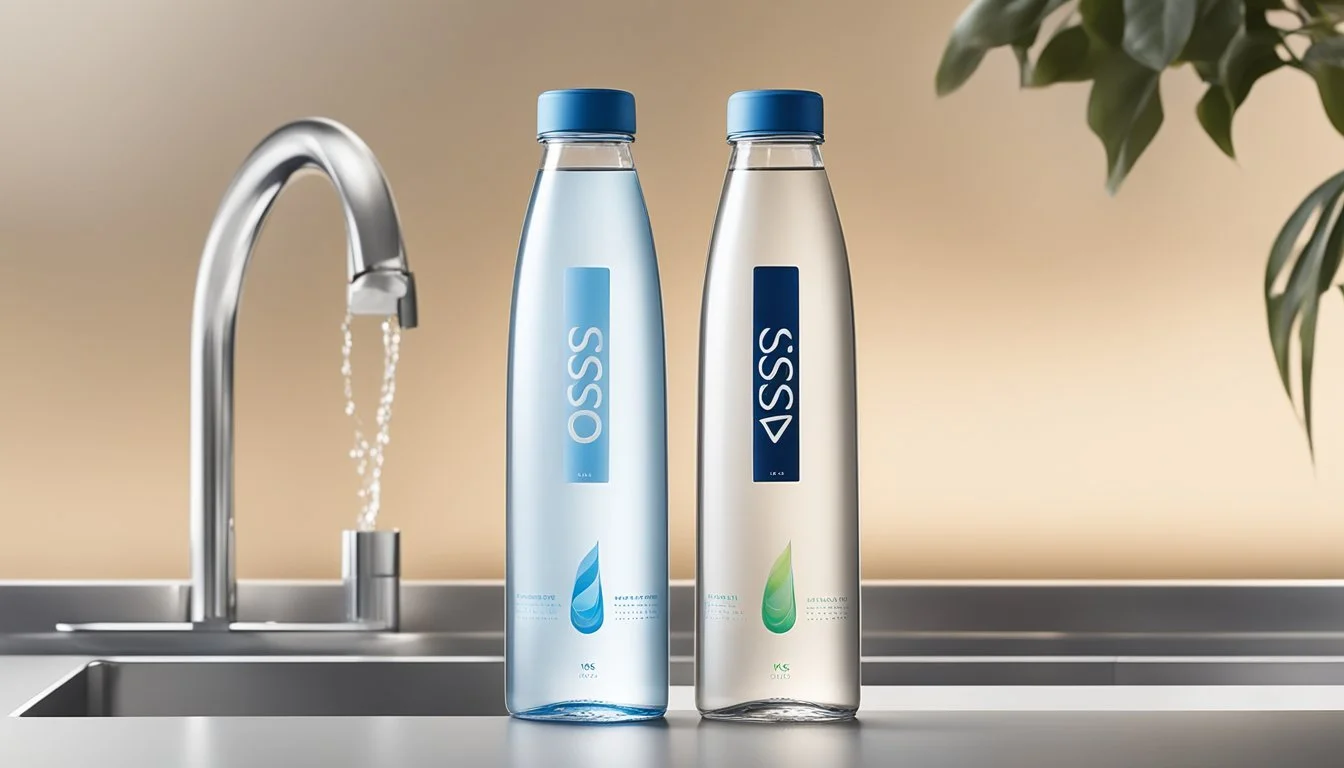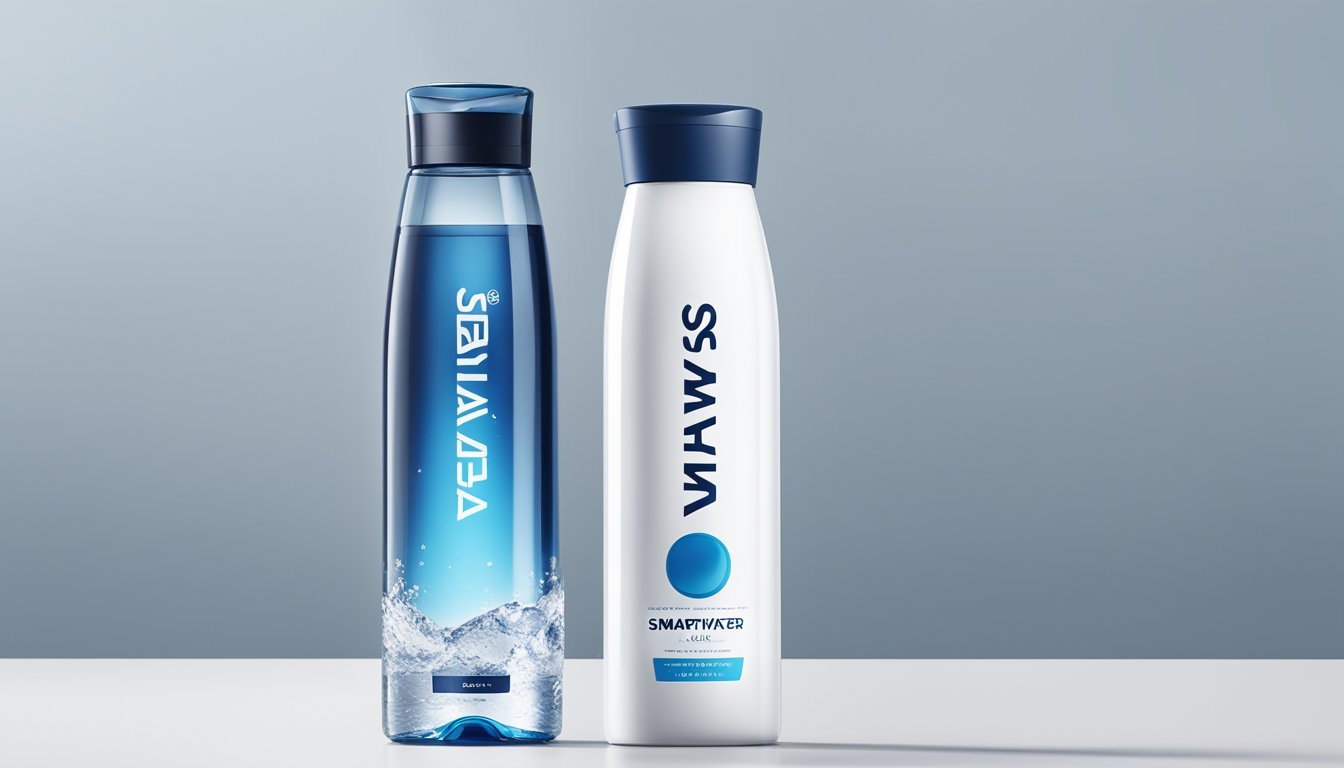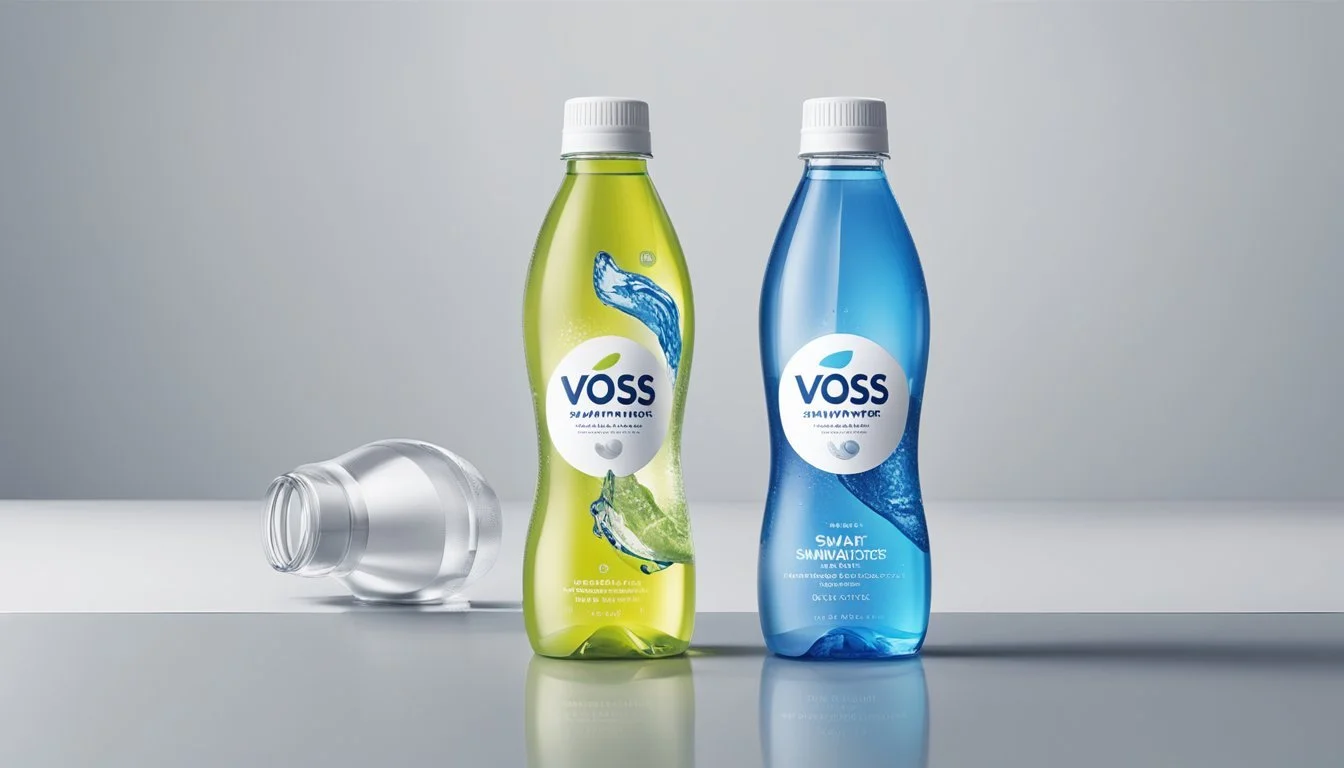Smartwater vs. Voss
A Comprehensive Comparison of Bottled Water Brands
In the realm of premium bottled water, Smartwater and Voss have emerged as well-known contenders. These brands are often pitted against each other by health-conscious consumers and water aficionados looking for not just hydration but also a taste and quality that justify their higher price points. Smartwater, developed by the beverage company Glaceau, prides itself on being vapor distilled—a process that mimics the hydrologic cycle, with added electrolytes for taste. In contrast, Voss boasts of its artesian source from the pristine wilderness of Southern Norway, offering natural purity and minimal human interaction in its bottling process.
The debate over which bottled water is superior depends on several key factors: taste, purity, packaging, and price. Consumers tend to base their preferences on the mineral content that affects the taste and the perceived health benefits, as well as the environmental impact of the packaging. Smartwater presents itself with a crisp taste due to its added electrolytes, targeting consumers that prefer a more enhanced flavor profile. Voss, on the other hand, appeals to those who seek the natural taste of water straight from the source, often described as refreshing and clean.
To arrive at a comprehensive comparison between Smartwater and Voss, it’s crucial to examine scientific data, customer reviews, and environmental considerations. Such an evaluation offers an informed perspective on which brand may hold an edge in the competitive bottled water market. While personal preference plays a significant role, understanding the nuances of each brand's offering enables consumers to make choices that align with their values and palate.
The Basics of Bottled Water
Bottled water is sold in various forms, from carbonated to distilled, and is available globally. Consumers turn to bottled water for several reasons, including taste, convenience, and perceived purity compared to tap water.
Major Bottled Water Brands:
Bottled water companies like Smartwater and Voss are amongst the popular brands. Smartwater, known for its electrolyte-enhanced water, and Voss, recognized its distinct bottle design and natural water sourcing, represent the diversity available in the bottled water market.
Source of Bottled Waters:
Where bottled waters originate is a key aspect of their branding. Natural water sources can include springs, artesian wells, or even volcanic sources, each contributing unique mineral profiles that affect taste and quality.
Considerations of Bottled Water vs. Tap Water:
Quality Assurance: Bottled water is subject to various testing and regulations, with standards for safety and quality. However, tap water is also regulated and typically safe for consumption.
Environmental Impact: The production and disposal of plastic bottles raise ecological concerns, leading some consumers and brands to seek more sustainable practices.
Distribution:
Bottled water brands may distribute globally, allowing consumers to access water from geographically distant natural sources.
Formats Available:
Still
Flavored
Electrolyte-Enhanced
Consumers should be aware that marketing of bottled water may not always reflect the true source or quality of the water inside. They are encouraged to research and make informed decisions regarding their water choices based on factual information.
Smartwater: Brand Overview
Smartwater is a product of The Coca-Cola Company known for its combination of vapor-distilled water and electrolytes for taste. This brand caters to those seeking a clear and refreshing bottled water with a purity that’s akin to natural water cycles.
Source and Purification
Smartwater undergoes vapor distillation, a purification process mimicking the natural hydrologic cycle. The water is heated into vapor, then cooled to remove impurities. Additional electrolytes, such as potassium bicarbonate and magnesium chloride, are added for taste after distillation.
Nutritional Profile
Each bottle of Smartwater contains a balance of electrolytes, essential for bodily functions and enhancing the water's taste. It boasts a clean and crisp profile, void of calories, sugars, or artificial colors and flavors, making it an appealing hydration choice.
Brand Presence
Smartwater has established a strong brand presence since its launch and is associated with the high-quality standards of its parent company, The Coca-Cola Company. It’s marketed as a premium water option and is widely available in various bottle sizes, catering to a broad audience seeking hydration with a touch of sophistication.
Voss: Brand Overview
Voss distinguishes itself in the bottled water market through its notable source, rigorous purification process, and a distinct mineral profile that has garnered a global brand presence.
Source and Purification
Voss Water originates from an underground aquifer in Southern Norway, shielded from air and other pollutants. It benefits from natural filtration processes as it passes through layers of sand and rock. The aquifer's location in a remote area contributes to the water's purity and the brand's reputation for providing high-quality spring water.
Nutritional Profile
The mineral content of Voss Water is relatively low compared to other bottled waters. This low mineral content gives Voss its clean, fresh taste. The nutritional profile includes essential minerals like calcium and magnesium, but the brand is also valued for what it lacks: minimal contamination and an absence of sodium, which is often prominent in other bottled waters.
Brand Presence
Voss asserts itself as a premium brand, recognized for both its sleek bottle design and the quality of its water. They have established a strong market presence and are a favorite in high-end restaurants, hotels, and by discerning consumers. Their marketing emphasizes sophistication and a commitment to environmental sustainability.
Taste Comparison
When evaluating the taste of bottled water, it is important to note that individual preferences can vary widely. However, discussing the taste profiles of Smartwater and Voss provides an interesting insight into these two premium brands.
Smartwater is known for its crisp and clean taste with a hint of sweetness. Its vapor-distillation process, inspired by the clouds, along with added electrolytes for taste, provide a distinctive smoothness that is often described by consumers as refreshing. This quality makes Smartwater a favorable choice for those who prefer a pure water taste with a touch of mineral enhancement.
Voss, on the other hand, boasts a more pronounced mineral taste due to its natural aquifer source in Norway. The unfiltered quality of Voss brings a fresh, clean taste that often incorporates subtle earthy notes. This characteristic flavor profile is appreciated by many for its natural purity and complexity.
Comparing other brands like Dasani and Aquafina, which are also mainstream options, it's observable that Dasani, a Coca-Cola brand, often has a heavier mineral taste, while Aquafina promotes a notably purified taste, due to its extensive filtration process.
Below is a brief comparison of the taste profiles:
Brand Origin Process Taste Notes Smartwater Vapor-distilled, electrolytes Crisp, clean, slightly sweet Voss Natural aquifer, unfiltered Fresh, clean, mineral-rich Dasani Mineral-added Heavier mineral taste Aquafina Purified Very pure, neutral
In conclusion, while both Smartwater and Voss deliver on their promises of high-quality, there are distinctive differences in their taste profiles due to their unique sources and purification processes. Their flavors can be as straightforward as Smartwater’s soft, subtle taste or as complex as Voss’s mineral-rich offering.
Health and Hydration
When considering bottled water for health and hydration, two critical factors play a pivotal role: the content of minerals and electrolytes and the water's pH balance and alkalinity. Each of these aspects contributes uniquely to the body's overall hydration and well-being.
Minerals and Electrolytes
Smartwater prides itself on its addition of electrolytes, specifically calcium chloride, magnesium chloride, and potassium bicarbonate, which are added for taste. These electrolytes serve crucial functions in the body such as muscle function and nerve transmission. However, the amount present is relatively low and is primarily for enhancing flavor rather than providing significant health benefits.
Voss, on the other hand, contains naturally occurring minerals from its underground source. The mineral content, including calcium and magnesium, differs depending on the source, but these minerals are essential for various body functions like bone health and energy production. These are also naturally occurring, as opposed to Smartwater's added electrolytes.
pH Balance and Alkalinity
The pH level of a bottled water indicates its acidity or alkalinity, with 7 being neutral. Smartwater is typically vapor-distilled and, as a result, has a pH that is close to the neutral mark. It is designed to replicate the purity and electrolyte levels of the natural water cycle.
Voss claims to have a naturally low mineral content and is also considered alkaline water, often boasting a pH level above neutral. Alkaline water has been associated with various health claims, including neutralizing acid in the bloodstream, which proponents suggest leads to increased oxygen levels and improved energy and metabolism. However, these claims often lack significant scientific backing and should be viewed with a degree of skepticism.
In terms of hydration, both Smartwater and Voss are effective; however, the presence of natural minerals in Voss may offer a marginal nutritional advantage to some consumers. It's important to note, as well, that pH balance can play a role in personal preference for taste and is another factor to consider when choosing the right bottled water for individual hydration needs.
Environmental Impact
When considering the environmental impact of bottled water brands such as Smartwater and Voss, the focus often narrows down to the sustainability of their packaging and the eco-friendliness of their broader sustainability practices.
Packaging
Smartwater primarily uses plastic bottles, which, while often recyclable, can contribute significantly to environmental pollution if not properly disposed of. The production process of plastic bottles requires petroleum and can release harmful compounds into the atmosphere.
In contrast, Voss offers water in glass bottles, which have a considerably lower impact on the environment due to the absence of chemicals like BPA. Glass can also be recycled indefinitely without loss of purity or quality. However, the heavier weight of glass compared to plastic increases transportation emissions.
Material Type Recyclability Environmental Impact Plastic (Smartwater) High (with proper disposal) More pollutants during production Glass (Voss) Indefinitely recyclable Higher transport emissions due to weight
Sustainability Practices
The companies behind Smartwater and Voss have different approaches to sustainability outside of their product packaging. Smartwater's producer, a subsidiary of a global beverage corporation, has comprehensive recycling initiatives and has been working towards reducing its carbon footprint and improving water efficiency in its bottling plants.
Voss has not only focused on offering a product in eco-friendlier packaging, but has also engaged in partnerships aimed at clean water projects and advocated for responsible water stewardship. Both brands face the inherent challenges of the bottled water industry, including resource extraction and the reliance on single-use packaging.
Sustainable initiatives may include:
Cutting down water usage in production
Carbon footprint reduction programs
Recycling and post-consumer recycled materials use
Evaluating the environmental impact of Smartwater versus Voss, factors like packaging material and the companies' sustainable practices weigh heavily on their respective ecological footprints. Each brand has taken steps to mitigate environmental harm, but the trade-offs between different materials and the broader context of global sustainability efforts remain significant considerations.
Price and Accessibility
Smartwater and Voss are both premium brands of bottled water that are widely available in various retail establishments such as supermarkets, convenience stores, and online platforms.
Smartwater is generally priced at a mid-range level. Given its distribution by The Coca-Cola Company, Smartwater boasts high accessibility and can often be found in a variety of settings, from vending machines to gas stations. It's typically available in multiple sizes, which offers flexibility in price and convenience for the consumer.
Voss, on the other hand, is positioned as a luxury brand. Its prices are accordingly higher than those of Smartwater. Voss water comes in distinct glass bottles, although plastic versions are available too, which add to its premium image but also impact the cost. Voss has a selective distribution, focusing on high-end retailers, hotels, and online stores, which can affect its convenience factor.
Brand Price Range (USD) Bottle Material Accessibility Smartwater Mid-range Plastic Widely available Voss Higher-end Glass/Plastic Selectively available
Shoppers will find that the price of Smartwater is generally more economical and can fit into a regular shopping budget more easily than Voss. Those looking for convenience will appreciate Smartwater's ubiquity, while those preferring a luxury product may not mind seeking out or paying a bit more for Voss.
Conclusion
When evaluating Smartwater and Voss on their respective merits, consumers typically consider factors such as quality, filtration process, and brand reputation. Smartwater prides itself on its vapor distillation process and the addition of electrolytes for taste, positioning it as a premium beverage choice. Voss, on the other hand, stakes its reputation on the source of its water—undefiled springs in Norway—and its minimalist but luxurious packaging.
Quality: Both brands have been praised for their clean, crisp taste. Smartwater undergoes vapor distillation, similar to the cycle of cloud formation, and is enhanced with a unique blend of electrolytes, while Voss water is naturally filtered and protected in an underground aquifer.
Filtration Process:
Smartwater: Vapor distilled, additional electrolytes.
Voss: Natural filtration, unprocessed purity.
In terms of environmental considerations, both brands use plastic and glass bottles, although Voss has a higher proportion of glass options which may appeal to eco-conscious consumers.
Regarding price, each is positioned as an upscale product; however, prices can vary depending on the retailer and the region. Voss may often be seen as a more luxury brand given its association with high-end venues and premium pricing strategy.
Ultimately, the selection between Smartwater and Voss for any individual hinges on personal preference for taste and brand perception. They should consider each brand's approach to sustainability, community impact, and overall water quality when making their choice.






